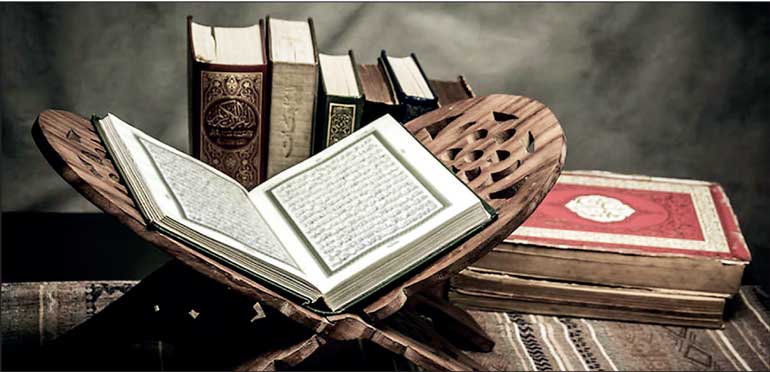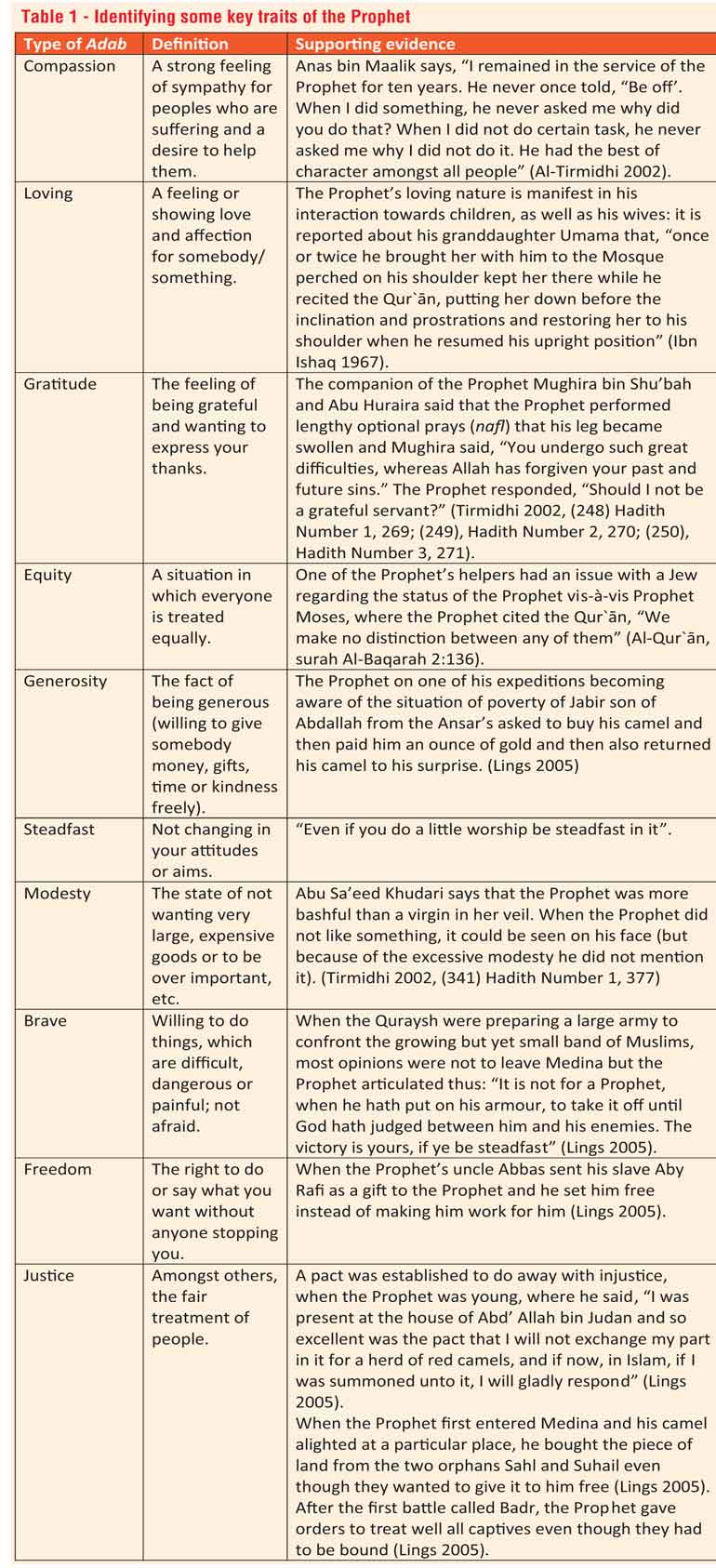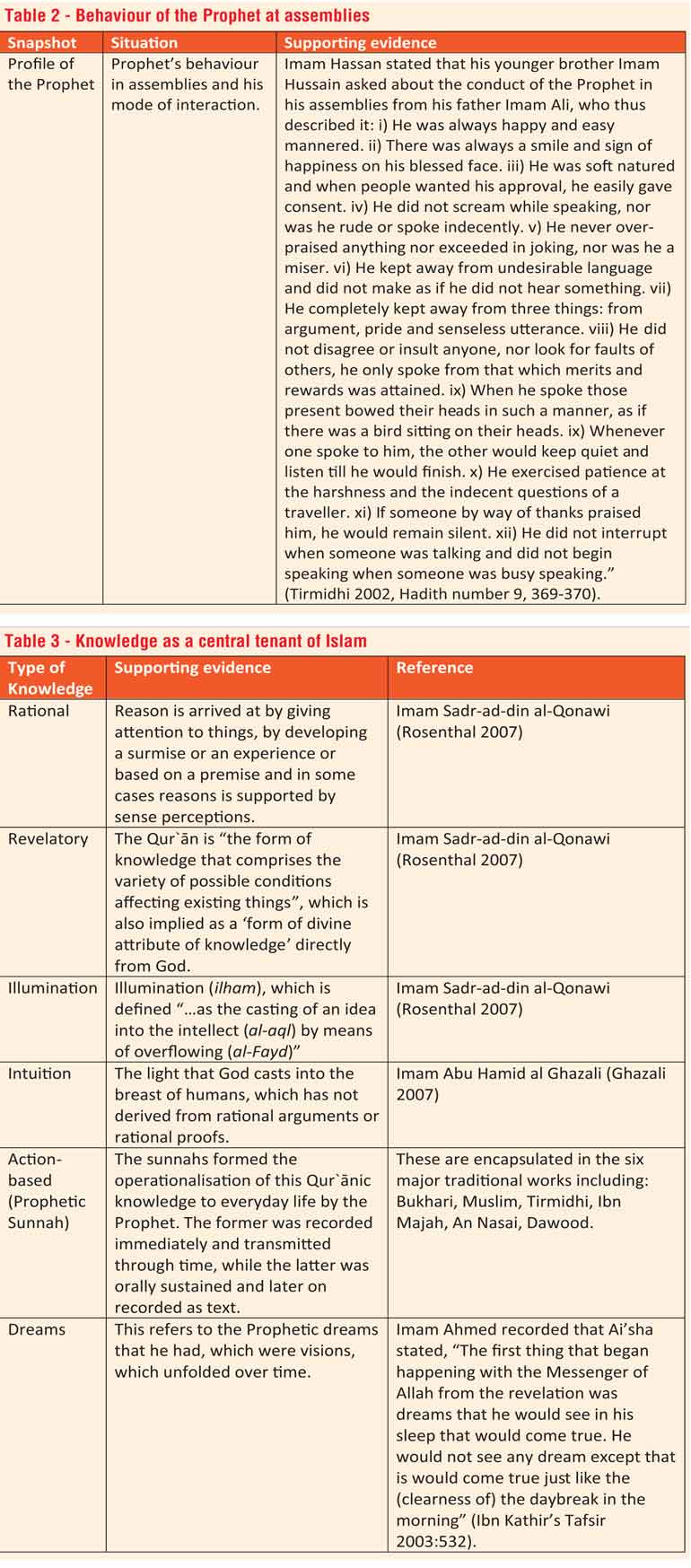Saturday Feb 21, 2026
Saturday Feb 21, 2026
Saturday, 23 April 2022 00:14 - - {{hitsCtrl.values.hits}}

By Dr. Mohamed Safiullah Munsoor
Introduction
This article demonstrates through the use of traditional sources that the Prophet1 was a human being of the highest calibre and a role model who changed the face of humanity. ‘Are people truly following his footsteps?’ is a question to be reckoned with. Martin Lings aptly portrays the evolving situation, which captures our modern state of life: “One of the functions of the Word-made book, with a view to the primordial religion that Islam claimed to be, was to reawaken in man his primeval sense of wonderment, which with the passage of time, had become dimmed or misdirected” (Lings 2005).
The prophetic code of conduct and his morality
The Prophet Muhammad was born in the 6th Century into one of the notable clans in Makkah (Mecca), an epicentre from time immemorial, with the focus being the Ka’bah.
The love of the Prophet Muhammad reigns high amongst the Muslims, where he is seen as the role model to be emulated. But do Muslims emulate both the Prophet’s inner and outer states? This is a question to be responded to and the answer would lie in their attitude and behaviour as will be seen in the ensuing discussion. The shahada or declaration of the Islamic faith itself requires one to testify the Oneness of God and that the Prophet Muhammad is His Prophet.
Thus, the Prophet is tied into the fabric of the faith, for he has authenticated the divine message and is thus the Messenger (rasul) who carried the message, as well as a Prophet (nabi) who delivered a new one superseding the older scriptural messages and/or confirming it.
The Prophet’s code of conduct and sense of morality
The approach in this section, will be to identify the traits of the Prophet, which essentially falls within the framework of morality (akhlāq) including his code of conduct, outlining its definition and providing supporting evidences to back it up. As Table 1 shows, the Prophet’s character was infused with virtuous qualities, which manifested in his code of conduct and which is a part of his spiritual legacy. The Islamic ethos is to role-model and to emulate these virtues, to follow the Prophetic model. One of the better ways to capture the behaviour of people is in various active situations and Table 2 presents the character of the Prophet and his code of conduct at the assemblies. What is apparent from his conduct in assemblies is that he was a person who was very considerate and civil, as contrasted with rulers and leaders who exercised undue authority on their subjects.
The Prophet’s worship and his spiritual nature
Knowledge is the central tenant that the Prophet emphasised in his discourse and actions. The divine revelations form the fountainhead of knowledge. This is captured in the message: “And if all the trees on the earth were pens and the sea, with seven seas behind it to add to it, yet the Words of Allah would not be exhausted. Verily Allah is All-Mighty, All-Wise” (Qur`ān, surah Luqman 31:27). Table 2 encapsulates its importance. Within Islamic cosmology, knowledge is divided into three main domains, namely, the divine directly from God; the rationale and the intuitive.
Knowledge (‘ilm) and the intellect (‘aql) form core elements (Table 3) within Islamic epistemology or the theory of knowledge and have a much wider scope and connotation than in the Western context, for it has given the “Muslim civilisation its distinctive shape and complexion” (Rosenthal 2007). Rosenthal asserts that there is no other term which has been more pervasive within Islam as ‘ilm’, in terms of its “depth of meaning and wide incidence of use.”
Within the Islamic context, the Qur`ānic narrative was a precursor to the development of knowledge, which was orally learnt and then transformed into a written form. The frequency with which the term ‘ilm occurs in the Qur`ān, as well as the emphasis given to it by the Prophet himself, are without doubt evidence of its prime importance. In this context, Rosenthal states that the Prophetic concept of knowledge “set intellectual life of Islam on its basically unchangeable course” (Rosenthal 2007).
This laying down of the concept, tools and objective enshrined within divine revelation and operationalised by the sunnah of the Prophet, which laid the platform for the development of the Islamic civilisation. The height of Islamic civilisation took place in what can be termed historically as the medieval period, albeit that this is a misnomer that this period is perceived as backward given the significant contribution Islam made to science, society and the intellectual tradition.
This Islamic platform, with its body of knowledge, accompanying rules, regulations and mission expanded not only in terms of territory but in increasing the knowledge base of society resulting in a height of intellectual civilisation. This has influenced both Eastern and Western societies and left its mark in history.
Knowledge, which took varied forms in the life of the Prophet, is evident in every sphere of his life from mundane to the scared. However, the Prophetic knowledge was pitched at different levels.
Footnote:
1The salutation with its peace and blessings on the Prophet is carried right through this article and therefore will not be recurrently mentioned. The readers can pronounce the salutations as they come across it.
(Note: The author wishes to acknowledge and thank Springer Nature, Switzerland for giving him permission to publish this article, which is a sub-section from his book titled: Well-Being and the Worshipper: Insights into an Islamic Spiritual Order, Series in Neuroscience, Consciousness and Spirituality, Springer Nature, Switzerland, AG, 2021, ISBN 978-3-030-66130-4.)
A different perspective
The Harmony page marks the nearing of completing three years since it was initiated in the Weekend FT newspaper in July 2019 to provide a different perspective to mass media by integrating holistic aspects such as spirituality and mother earth/indigenous and traditional knowledge related material.
We continue to encourage the broadening of humane understanding and changing the perspectives of what we think to be ‘education’ in a general global context where it is linked with rote learning and blind following of modern science. Instead we promote education as something connected to the heart more than the mind and interspersed with all aspects of the universe, including ancient sciences that remain unexplainable through the lens of Western science.
Through articles on the concepts of ‘God’ from diverse spiritual/cultural view points and philosophies, including the ancient nature focused beliefs, we have encouraged spiritual, intellectual as well as secular interpretations so that the general malady of nations and the world fighting over the ‘one and only’ righteous path’ would stop and instead nurture a reality where humanity would see wisdom and its inter-connected nature between culture, interpretation and ‘religion.’
Thus instead of wrangling over the different names for ‘God’ as decreed by different cultures and linguistics, we have encouraged a spiritual dissection and in-depth wisdom of narrative. We have given pride of place to the teachings of Lord Buddha and his messages for peace and are currently contributing to a local as well as global peace model based strongly on Buddhistic principles while embracing all dimensions of comparative spirituality.
By upholding the whole of humanity in this wondrous universe we occupy, the Harmony page initiative has attempted to contribute to a Sri Lankan peacebuilding model that is rooted in mother earth and encompassing all the knowledge of this ancient Sinhala civilisation. Alongside this, the FT Harmony page is part of an attempt to parallely introduce to the world a peacebuilding model rooted in the indigenous and traditional, the missing piece in the theoretics of modern peacebuilding which is at times as meaningless as the rest of modern education in the way it is taught in universities.

